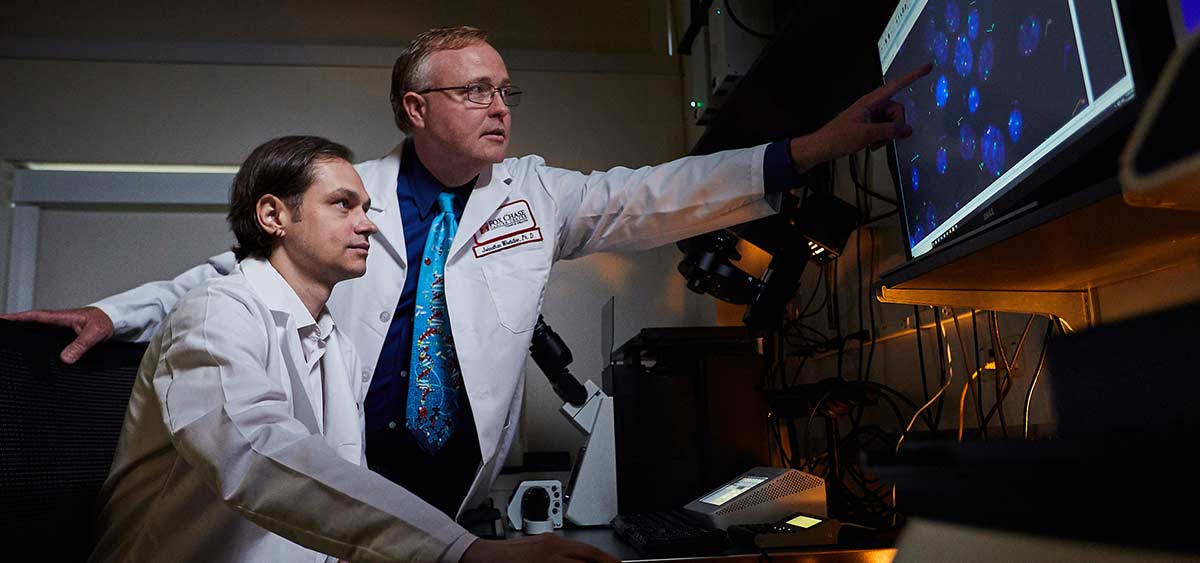Weather Alert: Following the winter storm, all Temple Health hospitals, campuses and clinical locations remain open. Patients will be contacted directly if their visit is affected. Please check TempleHealth.org or FoxChase.org for updates and monitor myTempleHealth for changes to scheduled appointments.
Breadcrumb
- Home
- Fox Chase Cancer Center News
- Johnathan R. Whetstine Awarded Lung Cancer Discovery Award
Johnathan R. Whetstine Awarded Lung Cancer Discovery Award

PHILADELPHIA (January 14, 2020) – Johnathan R. Whetstine, PhD, a program leader for the Cancer Epigenetics Program at Fox Chase Cancer Center, was recently awarded the American Lung Association’s Lung Cancer Discovery Award, a $100,000 grant to research epigenetic factors affecting lung cancer.
Epigenetics is the study of how DNA is modified or utilized in order to control its stability, expression, and organization without making changes to the DNA sequence. Therefore, understanding epigenetics assists in understanding what causes disease, which will lead to novel preventive and treatment strategies.
“The American Lung Association is really devoted to basic science discovery that can influence our understanding of lung cancer. I am really proud that they have continued to fund us and allow us to make these important discoveries,” said Whetstine, the Jack Schultz Chair in Basic Science.
Lung cancer is the leading cause of cancer-related deaths in the United States. Lung cancer is often difficult to treat because of the heterogeneity, or diversity, of the disease, especially in regard to DNA amplification—an increase in the number of copies of a gene—which can contribute to genome instability. This lack of stability contributes to lung-cancer associated risk and drug resistance.
The award will allow Whetstine’s lab to follow up on previous work investigating epigenetic factors that control copy number gains, which contribute to heterogeneity within lung tumors. They discovered eight enzymes that lead to localized copy gains of regions linked to drug-resistant lung cancer.
“In the context of EGFR [epidermal growth factor receptor], for example, the research will also try to understand the interplay of those epigenetic factors that influence EGFR amplification in lung cancer,” Whetstine said.
The main goal of the new research is to build a network of the regulatory input signals that are influencing heterogeneity through copy number mechanisms. “By understanding what those are in lung cancer, we can have better biomarkers and possibly identify therapeutic targets,” Whetstine said.
“The American Lung Association is honored to fund research projects that are changing the face of medicine. Whetstine’s research in epigenetics has the potential to help us uncover new approaches to treat aggressive, drug-resistant lung cancer and ultimately save more lives,” said Albert A. Rizzo, MD, FACP, chief medical officer at the American Lung Association.
Additionally, the research will hopefully identify novel drug targets for lung cancer and investigate the use of chemistry or tools to change and control copy number.
Whetstine also received the Lung Cancer Discovery Award in 2014 and 2017.
Fox Chase Cancer Center (Fox Chase), which includes the Institute for Cancer Research and the American Oncologic Hospital and is a part of Temple Health, is one of the leading comprehensive cancer centers in the United States. Founded in 1904 in Philadelphia as one of the nation’s first cancer hospitals, Fox Chase was also among the first institutions to be designated a National Cancer Institute Comprehensive Cancer Center in 1974. Fox Chase is also one of just 10 members of the Alliance of Dedicated Cancer Centers. Fox Chase researchers have won the highest awards in their fields, including two Nobel Prizes. Fox Chase physicians are also routinely recognized in national rankings, and the Center’s nursing program has received the Magnet recognition for excellence six consecutive times. Today, Fox Chase conducts a broad array of nationally competitive basic, translational, and clinical research, with special programs in cancer prevention, detection, survivorship, and community outreach. It is the policy of Fox Chase Cancer Center that there shall be no exclusion from, or participation in, and no one denied the benefits of, the delivery of quality medical care on the basis of race, ethnicity, religion, sexual orientation, gender, gender identity/expression, disability, age, ancestry, color, national origin, physical ability, level of education, or source of payment.
For more information, call 888-369-2427